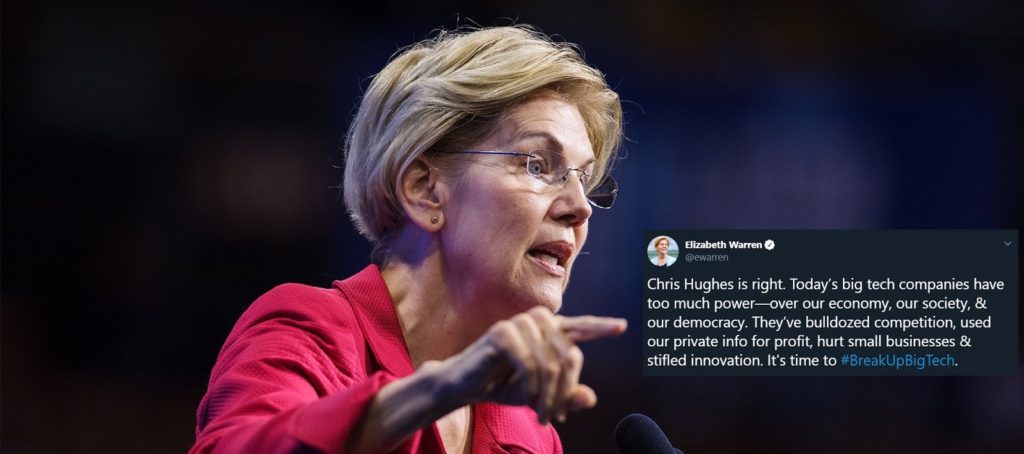
There has been a lot of discussion recently regarding the market power of Big Tech companies and what can be done about it, most notably Sen. Elizabeth Warren’s plan to use antitrust laws to break up Big Tech.
On the topic of Big Tech antitrusts, the first thing that comes to mind is acquisitions and mergers, like Facebook and Oculus, Google and Waze, or Amazon and Twitch. These acquisitions are certainly detrimental to competitiveness because they concentrate the market. Traditional antitrust policies counteract this effect by breaking up the market into multiple competing firms. However, while these acquisitions are generally detrimental, they are fascinatingly not what constitutes Big Tech’s main source of market power.
Consider this: What are the actual barriers to creating a social network on the scale of Facebook?
Having enough quality features to be competitive requires a lot of initial investment, but this is the least complicated part of the whole process. The very core features of Facebook are just a basic CRUD-a.k.a. copy, read, update, and delete. Asking a group of Tandon students to write a stripped-down version of Facebook as a capstone project would probably give you pretty usable results. And we live in a Silicon Valley world, where venture capital money is virtually infinite, and an app to send a contextless greeting to a friend can raise $1.5 million in investments. It seems unlikely that the development cost would be a huge roadblock to new entrants in the market.
An advertisement for “Yo!,” an app that lets users send the word “yo” to their friends./ justyo.co
Just looking past Facebook makes the low technical barrier of entry even more clear. Virtually every popular social media platform has some kind of commercial or open-source alternative. With so many people dissatisfied with Whatsapp, why aren’t people just moving to Matrix? Why hasn’t Mastodon taken over the world when Twitter users seem to complain about every change made to the platform? Why do people feel forced to have a Facebook account, when they could just be on diaspora?
The reality is that tech companies get their market power from a more subtle, pervasive barrier of entry: switching costs.
As a customer, when you’re changing suppliers for a specific product, you will often incur switching costs, usually because it takes some effort to find a better supplier, you might have to change some of your habits or processes, etc. Usually, these costs are small enough to not impede the underlying competition effects too much. In the long term, with new entrants in the market choosing directly the better product, these effects will fade out.
This doesn’t work as well for tech services, though. If you want to move from Facebook, you can’t just pick another service and subscribe, unless you want to give up your existing contacts and social network. You either have to convince all your friends to move with you or give up on some of your friends. But the first step isn’t as simple as it looks, as your friends also recursively have the same problem: why would they switch to a different platform when all their friends are already on Facebook? Switching is an almost planet-wide coordination problem, and the costs of doing so for individuals dissatisfied with the platform are completely prohibitive.
As a side note, this is also why social networks have generational gaps: one generation on Facebook, another on Instagram, another on Snapchat, Tiktok, etc. When you have a cluster of new entrants on the demand side, who incidentally, being rebellious teens, don’t care about having social links with preexisting people (their parents), and can thus afford the social costs of picking a different platform.
At a first glance, it might seem that this problem is unsolvable. You can break up Big Tech companies however you want, the switching costs won’t disappear, and might even get worse.
However, there is a theoretical solution to this problem: interoperability. Tech companies in monopoly positions have an incentive to create walled gardens around their users and cut down interoperability with other services to increase switching costs, so that people become stuck and can’t afford to use other services that communicate with the service they’re dissatisfied with.
The inability of something to be interoperable with other ecosystems is one of the greatest determining factors of the market power of Big Tech companies. One of the most well-known examples of this is Microsoft, which was able to purposefully degrade interoperability in the operating systems market to consolidate its monopoly. On the hardware side, Apple is notorious for the incompatibility in its laptop and phone chargers.
This happens very frequently, but usually with backend or less popular features that go under the radar. In 2015, Facebook discontinued its XMPP gateway, preventing third-party applications from communicating with Facebook Messenger. In 2018, Slack did the same with its IRC gateway. In 2014 Facebook also shut down the Friend Data API that allowed third party social networks to display people’s activity feed. In 2018 Twitter shut down some streaming APIs, making it impossible to create third party clients that get a streaming feed of tweet updates. Gmail in 2019. Signal in 2016. Whatsapp and Snapchat just completely ban accounts that are caught using third-party apps.
Mandating third party data access for these companies would, however, be a great solution to the switching costs problem. If someone can use diaspora and see all of their friends’ data on Facebook, or use Whatsapp and see friends’ Snapchats, and do the same thing for every social service, nobody would need to convince friends to switch platforms. People will naturally go towards the service that they like the most, while still being able to enjoy the social networking value of these services due to the social links that already exist.
The same concept applies to other sources of market power of Big Tech outside of social media. Digital rights management software work in a similar fashion to create walled gardens. Why is Steam cornering the market for video game purchases on PC? Because DRM prevents people from taking their existing video game library and bringing it to a competing platform. Even in a situation like this year, where the competing Epic Games Store entices developers and publishers with a far more generous 12 percent cut, struggles to gain a foothold against Steam for the simple reason that users like to see all their games, achievements, servers, and friends list in one client. As another example, iTunes, in its inception, did not allow music bought on the service to play on anything other than an iPod.
The European Union, which is well known for its aggressive stance against monopolies, has already started to address this problem by making the right to portability one of the provisions of the GDPR. However, this is not sufficient, because a customer downloading an offline dump of their data isn’t good enough to interoperate through third party applications. While being able to take data offline is a step towards consumer privacy protections, what actual good is a dump of raw data that the average consumer has no idea how to use?
In 2018, a paper from the Hamilton Project, a branch of the Brookings Institution, a centrist economic think tank, outlined three policy points that would act in different ways to current antitrust legislation but for the same purpose of reducing the market power of huge companies.
1. Obligate tech companies to provide reasonable ways to interoperate with live services dealing with personal data and communications.
2. Obligate tech companies to make virtual purchases portable to the extent that it is possible, notably by prohibiting DRMs that lock in single platforms
3. Enforce well-proven technical hardware standards like USB-C to improve compatibility between different physical devices.
If Senator Warren wants to go further than even the EU regulations and satisfy the desires of consumers in a way that could be implemented in the United States, her policy must bridge the gap between individual privacy protections (like those in GDPR) and the ability for American tech firms to stay relevant in increasingly competitive global markets. The Hamilton Project’s policy proposal is currently the best way to keep the tech sector’s competition healthy and encourage innovation while giving consumers more choice in their social networks, physical devices, and digital purchases.
Arya Tousi



